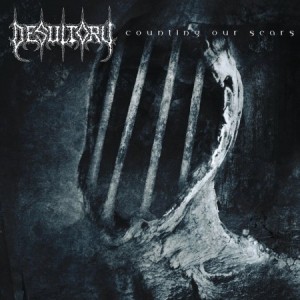 The term “melodic death metal” has lost all meaning with the rise of its postmodern form, which is essentially heavy metal or power metal (speed metal + later heavy metal) with death vocals, played at twice normal speed and using tuning and mode to achieve a melodic sound. The genre often fails because in an effort to deliver lots of those sweet ripping melodic moments, it renders itself uniform and thus passes like sonic wallpaper.
The term “melodic death metal” has lost all meaning with the rise of its postmodern form, which is essentially heavy metal or power metal (speed metal + later heavy metal) with death vocals, played at twice normal speed and using tuning and mode to achieve a melodic sound. The genre often fails because in an effort to deliver lots of those sweet ripping melodic moments, it renders itself uniform and thus passes like sonic wallpaper.
The best of the genre either takes after early Dissection, which is essentially heavy metal, or early At the Gates, which is essentially death metal. In the middle, there are those who combine the two, making what sounds like a cross between early Dissection and early Necrophobic. In this area, bands like Unanimated, Sentenced, Cemetary and Sacramentum made their great works. Desultory fit into this picture as well but was always just a bit more predictable and catchy than those bands would admit into their own music.
Some call it obvious, but the history of art shows us that the person who makes the most evocative form of obvious basically states what everyone is too neurotic to think clearly, and becomes a winner. For that reason, it’s a terrible shame that this album has been overlooked since it is better than almost everything to come out in the genre recently. Opeth and BloodBath fans in particular might enjoy this album which is equal balanced parts beauty and virulent darkness.
Riffs are catchy and strike a good balance between melodic hook and infectious rhythm with some aggression to it, a form which is downplayed but provides a good internal counterpoint to the sweet spots (in contrast to most bands, who do this externally by playing the verses as grinding madness and the chorus as undistorted or sickeningly over-harmonized AOR riffs). In song structure, this album is more like older death metal of the melodic type, but its soul is pure heavy metal of the type that dominated the airwaves in the 1980s, just with twice the complexity and technicality.
In many ways, this album fulfills the promise of melodic metal. It’s like a cross between Iron Maiden Number of the Beast and Slayer Reign in Blood. This is a hard mix to get right, and it’s fair to note that there’s more hard rock in this than even in Iron Maiden, but the end result is very pleasant listening that maintains a sense of longing and beauty in its atmosphere, while simultaneously raging against the darkness.

